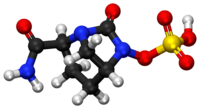Avibactam
 | |
 | |
| Clinical data | |
|---|---|
| Trade names | Avycaz (formulated with ceftazidime) |
| Routes of administration | IV |
| ATC code |
|
| Legal status | |
| Legal status |
|
| Pharmacokinetic data | |
| Bioavailability | 100% (intravenous) |
| Protein binding | 5.7–8.2%[1] |
| Metabolism | Nil |
| Onset of action | Increases in proportion to dose |
| Excretion | Renal (97%) |
| Identifiers | |
| |
| CAS Number | |
| PubChem CID | |
| ChemSpider | |
| KEGG | |
| ChEBI | |
| ChEMBL | |
| Chemical and physical data | |
| Formula | C7H11N3O6S |
| Molar mass | 265.24 g/mol g·mol−1 |
| 3D model (JSmol) | |
| |
| |
Avibactam is a non-β-lactam β-lactamase inhibitor[2] developed by Actavis (now Allergan) jointly with AstraZeneca. A new drug application for avibactam in combination with ceftazidime (branded as Avycaz) was approved by the FDA on February 25, 2015, for treating complicated urinary tract (cUTI) and complicated intra-abdominal infections (cIAI) caused by antibiotic resistant-pathogens, including those caused by multi-drug resistant Gram-negative bacterial pathogens.[3][4][5]
Increasing resistance to cephalosporins among Gram-(−) bacterial pathogens, especially among hospital-acquired infections, results in part from the production of β-lactamase enzymes that deactivate these antibiotics. While the co-administration of a β-lactamase inhibitor can restore antibacterial activity to the cephalosporin, previously approved β-lactamase inhibitors such as tazobactam and clavulanic acid do not inhibit important classes of β-lactamases, including Klebsiella pneumoniae carbapenemases (KPCs), New Delhi metallo-β-lactamase 1 (NDM-1), and AmpC-type β-lactamases. Whilst avibactam inhibits class A, class B, and, some, class D serine β-lactamases (such as KPCs, AmpC), it has been reported to be a poor substrate/weak inhibitor of class B metallo-β-lactamases, such as VIM-2, VIM-4, SPM-1, BcII, NDM-1, Fez-1.[6]
References
- ^ "Full Prescribing Information: AVYCAZ™ (ceftazidime-avibactam) for Injection, for intravenous use". ©2015 Actavis. All rights reserved. Retrieved 1 June 2015.
- ^ Wang, David Yuxin; Abboud, Martine I; Markoulides, Marios S; Brem, Jürgen; Schofield, Christopher J (2016-06-01). "The road to avibactam: the first clinically useful non-β-lactam working somewhat like a β-lactam". Future Medicinal Chemistry. 8 (10): 1063–1084. doi:10.4155/fmc-2016-0078. ISSN 1756-8919.
- ^ Zhanel, GG (2013). "Ceftazidime-avibactam: a novel cephalosporin/β-lactamase inhibitor combination". Drugs. 73 (2): 159–77. doi:10.1007/s40265-013-0013-7. PMID 23371303.
- ^ "Actavis Announces FDA Acceptance of the NDA Filing for Ceftazidime-Avibactam, a Qualified Infectious Disease Product". Actavis—a global, integrated specialty pharmaceutical company—Actavis. Actavis plc. Retrieved 1 June 2015.
- ^ Ehmann, DE; Jahic, H; Ross, PL; Gu, RF; Hu, J; Durand-Réville, TF; Lahiri, S; Thresher, J; Livchak, S; Gao, N; Palmer, T; Walkup, GK; Fisher, SL (2013). "Kinetics of Avibactam Inhibition against Class A, C, and D β-Lactamases". The Journal of Biological Chemistry. 288 (39): 27960–71. doi:10.1074/jbc.M113.485979. PMC 3784710. PMID 23913691.
{{cite journal}}: CS1 maint: unflagged free DOI (link) - ^ Abboud, Martine I.; Damblon, Christian; Brem, Jürgen; Smargiasso, Nicolas; Mercuri, Paola; Gilbert, Bernard; Rydzik, Anna M.; Claridge, Timothy D. W.; Schofield, Christopher J. (2016-07-11). "Interaction of Avibactam with Class B Metallo-β-lactamases". Antimicrobial Agents and Chemotherapy: AAC.00897–16. doi:10.1128/AAC.00897-16. ISSN 0066-4804. PMID 27401561.
External links
- T. Edeki; J. Armstrong; J. Li. "Pharmacokinetics of Avibactam (AVI) and Ceftazidime (CAZ) Following Separate or Combined Administration in Healthy Volunteers". Archived from the original on 2016-03-03.
{{cite journal}}: Cite journal requires|journal=(help); Unknown parameter|deadurl=ignored (|url-status=suggested) (help)
